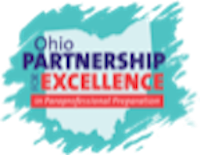Fairfield County ESC: Champions of Children, Leaders in Innovation and Thought Partnership

July 2024
The Fairfield County Educational Service Center (ESC) exists for the purpose of providing student-centered educational leadership and supportive services to meet the individual and collective needs of the staff, students and boards of education of the eight local school districts located in Fairfield County (see https://www.faircoesc.org).
Under the direction and leadership of Superintendent Dr. Marie Ward, the ESC’s number one priority is meeting the needs of its clients, as illustrated by its motto, Quality Service on a Personal Level.
“We have three expectations for our staff – two that we’ve had for the 10 years I’ve been here, and the third we added post-COVID. The first expectation is that our staff are champions of children, the second is that our staff are ambassadors of the ESC, and the third is that our staff be well so that they engage in activities. If they're not well and they're not present, we can't serve kids,” explained Ward.

Fairfield Co ESC serves eight local education agencies (LEAs) ranging in size from the largest, Pickerington Local Schools, to the smallest, Walnut Township, with fewer than 500 children. “We have a range of districts in Fairfield County and a long history of selling services throughout the state, to other states, and to other countries. For example, we served multiple cohorts of Korean teachers for a couple years through our project-based learning,” said Ward. Fairfield County ESC employs between 200 and 300 individuals, and also employs close to 600 substitute teachers at any given time.
Accelerating Learning, Supporting All Children to Excel
Fairfield County ESC has been a leader in key areas that align with the Future Forward Ohio strategic priorities of the Ohio Department of Education and Workforce (DEW): (1) Literacy, (2) Accelerating Learning (focusing on Literacy & Numeracy), (3) Workforce Readiness, and (4) Student Wellness. DEW proposes the use of three strategies for improving student outcomes, including accelerating learning by providing opportunities to learn, overcoming obstacles to learning by addressing barriers such as attendance and mental health, and preparing students for future success through career and college connections that help students transition to meaningful postsecondary endeavors (DEW, 2024).
“We’re the entity that districts often turn to in helping with specialized services and supports to enable every child to meet their greatest potential,” explained Ward.

Literacy. Fairfield County ESC provided LETRS professional learning through a large project with Lancaster City Schools, and provided offerings and supports to districts in the region in the use of structured literacy aligned with the Science of Reading. The ESC was part of an initial cohort to support educators to complete Aimesweb training, a benchmark and progress monitoring system for providing frequent, accurate measures of student performance in reading, spelling, and other areas.
“That we're even having conversations about the science of reading means the data was ignored way back in the day. The whole language approach that was being taught, which ignored the phonemic awareness component, was ignored because people decided it wasn't important, that it wasn't a critical element, and, in fact, it was the most critical element!” said Ward.
“That we're even having conversations about the science of reading means the data was ignored way back in the day. The whole language approach that was being taught, which ignored the phonemic awareness component, was ignored because people decided it wasn't important, that it wasn't a critical element, and, in fact, it was the most critical element!”
- Marie Ward, PhD, Superintendent, Fairfield County ESC
All preschool teachers were trained through a multi-year grant that improved practice across 31 early childhood special education preschool classrooms administered through the ESC. Attending to the literacy achievement of the region’s youngest learners has been a priority of the ESC for many years, beginning with the establishment of the Early Literacy Kindergarten Readiness Collaborative, which works with representatives from different agencies in the county, including representatives from local school districts, to provide supports to parents, community daycare providers, and others.
“We've helped many of them improve their Step Up To Quality status and support our parents and the providers of littles to help them understand what children need to know to come into kindergarten successfully,” said Ward.
Accelerating Learning. Fairfield County ESC has implemented programs to accelerate student learning for many years, having served as one of the original competency-based education sites in the state. Prior to joining Fairfield County ESC, Ward worked with teams to develop educational alternatives to enhance and extend student learning. One such program involved a collaboration between what was the Delaware-Union County ESC and the Columbus Zoo and Aquarium. “That was before there was any such thing as project-based learning, before there was anything called authentic or career-based learning that involved embedded practice for kids,” explained Ward.

Fairfield County ESC has continued to build on work that began with an initial competency-based grant, followed by three Straight A grants in 2015 that provided about $18 million in comprehensive school reform funding to support projects like Fast Forward – Fairfield Advancing Students and Teaching Forward and Math Matters.
The Straight A Fund, proposed by then Governor John Kasich, was intended to support the implementation of innovative practices and provided grants to support local education agencies in raising student achievement, reducing spending, and using a greater share of resources in the classroom.
“We've done this work for a long time. Fast Forward was based on a multi-faceted logic model that addressed both academic and nonacademic barriers to success in the county and tried to build the capacity of our systems to support children in a better way. Attendance was a piece of that before people were talking about attendance,” said Ward. “Math Matters was supported through a large grant that worked with 10 districts,” she added.

Workforce Development. Fairfield County ESC operates an alternative high school – The Success Center – as part of its array of services for expanding learning opportunities for high school students in the region. Placement in The Success Center allows students to earn high school credits through online, blended, and face-to-face formats that focus on the whole child and the delivery of personalized services to meet each individual student’s needs.
Students served by The Success Center receive social-emotional support, the opportunity to develop work-ready skills, and a high school diploma upon completion of requirements. “I view children holistically and we have a long history of doing work with the most challenging students that enroll in our schools,” offered Ward. Additional services in the area of workforce development include supporting youth with disabilities to make smooth transitions to meaningful postsecondary endeavors, collaborative efforts with the ESC’s Business Advisory Council and Fairfield County commissioners, and a workforce development center that offers one-year pathways for graduation.

Wellness. Fairfield Co. ESC offers a number of different initiatives to support wellness. “We began partnering and working with our local ADAMH Board to leverage local dollars to support prevention initiatives. This was pre-COVID, and one of the first things they were willing to do was fund us to partner with Nationwide Children's Hospital and train trainers in the use of the Good Behavior Game,” explained Ward. The Good Behavior Game or GBG (Barrish, Saunders, & Wold, 1969) , first tested in 1969, is intended to increase on-task instructional time in the classroom and reduce inappropriate behavior.
The Fairfield County ADAMH Board provides funding to districts in Fairfield County and the ESC to purchase prevention-oriented materials focused on suicide prevention, risks associated with vaping and opiate misuse, and more. “We recently received grant money to partner with an entity called Playbl, a behavioral health non-profit created out of years of research at Yale University with a medical doctor named Lynn Fiellin that makes video games for adolecents,” said Ward. Fiellin is the founding director of the play2PREVENT Lab.
In Fall 2024, Fairfield Co. ESC will pilot the use of the games, free of charge, to middle school students in the county, beginning with youth who are involved with the juvenile court and those at risk of being suspended or expelled. Ward explains: “Rather than suspending them, we’re going to use this as a diversion tool. Why would you want the kids you’re most worried about to be out of school? Let’s keep them in. Let’s help use it as a learning opportunity to teach them some of the skills and the knowledge necessary to make better decisions.”
Rethinking Time and Space

Three years ago, Fairfield County ESC embarked on a journey to create customizable professional learning and staffing solutions to meet district needs. The result - InnevAto EDU – derived from an Italian word for peak, refers to an increasing array of student courses, professional learning courses, and community learning courses.
“We're working to help every child reach their peak or the apex, which is why we called it InnevAto EDU,” explained Ward.
Jennifer Sayre moved from Hilliard City Schools to Fairfield County ESC where she serves as the Director of Applied Technology and leads the InnevAto EDU development effort. “I met Marie and came over to the Fairfield County ESC to develop a catalog of student courses that would be high quality and affordable and to give our districts another option. We wanted to create something in partnership with districts instead of just saying, ‘here’s a product and you’re a client, take it,’” said Sayre.
“We couldn’t have done this without Jennifer. She’s a crazy unicorn and we felt like we hit the lottery when she came on board,” added Ward. Sayre has more than 20 years of experience in designing and supporting educators in the use of K-12 online courses.

Courses developed include general education courses, honors courses, credit recovery courses, electives, courses that meet all graduation requirements, and some 6th through 8th grade courses. “All of our courses have been developed through a research-based instructional framework that is based on Quality Matters,” explained Sayre.
Quality Matters (QM) is the “global organization leading quality assurance in online and innovative digital teaching and learning environments” (see https://www.qualitymatters.org). Fairfield County ESC serves as the QM hub in Ohio. In addition to meeting QM standards, all ESC-developed courses meet World Wide Web Consortium (W3C) accessibility standards, International Society for Technology in Education (ITSE) standards, NCAA standards, and are Americans with Disabilities Act (ADA) compliant. “We’ve trained all of our teachers and embed a focus on diversity, equity, and inclusivity; and social emotional learning throughout all of the courses,” offered Sayre.
Prior to starting InnovAto EDU, Fairfield County ESC purchased online courses from vendors that did not meet Ward’s standards for quality. “So, you've heard the duck analogy. It looks like a duck; it walks like a duck, but nobody checked whether it had webbed feet. They weren’t quality courses and the kids were clicking through when engaging in the activity, but weren’t mastering what they need to master,” she recalled.
Courses purchased through another vendor during the first year of the pandemic initially served about 10,000 students across 18 districts; however, the cost for purchasing 10,000 licenses suddently became the cost for purchasing only 1,000 licenses in the second year. “So, it became untenable and we could no longer continue with it. They also didn’t have certain courses we needed, they weren't built by Ohio teachers, and they weren't aligned directly with Ohio standards,” said Ward.
“We needed to get to the place where we had ongoing funding or a contract to help support every district and we thought a lot about the lack of equity and access to our rural districts in the state of Ohio. Having access to this system of supports and high-quality courses to enable every child to excel is really sort of ‘the why’ behind it. But we do view ourselves as partners,” she added.
Now, we’re a vendor for districts who purchase seats for various courses we’ve developed. “We really focus on providing quality service on a personal level and teachers that were part of development teams and are licensed in different content areas serve as part of our quality assurance team. Their sole role is to be a support for district teachers in their particular content area, to take feedback, answer questions, and support the continuous improvement of the courses based on feedback from the partners,” said Sayre.
The ESC also provides extensive training and support to teachers in districts that use the courses, including the provision of teachers of record in best practices of online course delivery. Sayre explains:
“If a smaller district or a career technical center – CTC – needs a teacher of record, for example in health, we now have teachers available who are trained in using the courses, using the learning management system, and in the best practices of teaching online. We provide training and support for how to best use the courses and the majority of our partners are not using us for teachers of record. They have their own teachers; they're partnering with us in how to use the courses. Teachers of record are used more frequently in alternative programs to support credit recovery, and using them in a blended environment. For example, we're entering into a CTE partnership with Springfield-Clark CTC with the goal of really helping them to rethink time and space.”

Ward’s approach to providing quality services on a personal level begins with a conversation to identify the district’s pressure points, concerns, what they aren’t currently able to do, and how the ESC can be a ‘thought partner’ in developing a solution. “We’re very different than a vendor that’s just trying to make a sale. The courses are just a tool and they can be used in a variety of different ways to accelerate learning, help students get caught up, and enable kids to have flexibility to take courses their district doesn’t offer because they’re too small,” said Ward.
Expanding Capacity
Fairfield County ESC’s work not only addresses student need, but also extends to providing support for adults (administrators, teachers, paraprofessionals, others) and the community. Ward is the incoming President of the Ohio Educational Service Center Association (OESCA). “Courses to meet student needs is our biggest area and is growing the fastest, but we're working to provide flexible, quality opportunities for anybody who's connected to our school districts,” said Ward.
Developing the knowledge and skill of paraprofessionals in the region is a major focus of the ESCs work. “The role that paraprofessionals play in supporting children is instrumental. They are a critical member of the team and they’ve had a voice in the improvement of services and the updating of their job description. We bring them to the table and we engage them as professionals in that process,” said William Kirby, Fairfield County ESC Assistant Superintendent.

Fairfield Co. ESC is a partner in the Ohio Partnership for Excellence in Paraprofessional Preparation (OPEPP), a statewide initiative developed and led through the University of Cincinnati Systems Development & Improvement Center with support from the Ohio Department of Education and Workforce. OPEPP’s goals are to:
- improve the capacity of instructional teams by mobilizing and coordinating all personnel, including paraprofessionals;
- improve district, school, and teacher use of paraprofessional services to advance learning for all students;
- provide guidance and supports to districts in helping build the professional knowledge and skills of teachers for their work with paraprofessional colleagues;
- provide guidance and support to districts in helping build the knowledge and skills of paraprofessionals; (5) help districts and schools deploy staffing arrangements that fit with best practice while also addressing local needs; and
- inform state-level policies and actions to promote the use of inclusive service delivery models that support the learning of all students.
Kirby is a former local district superintendent, principal, curriculum director, and secondary math teacher who leads a variety of initiatives for districts in the regions, including support for the use of the Ohio Improvement Process (OIP) to support district focused goal setting and implementation of evidence-based practices to meet identified district needs.
The OIP uses a five-step “plan-do-study-act” process in concert with aligned leadership team structures (i.e., district leadership team, building leadership team, teacher-based team) to support improvement of teaching and learning across the system. Resources available from the Ohio Leadership Advisory Council (OLAC), including the 3rd edition of Ohio’s Leadership Development Frameork (BASA, 2022) are shared with districts in the region to support their work.
“There’s so much out there. We connect people to what’s important and serve as a hub for many groups – school psychologists, counselors, special education coordinators, principals – to help build their capacity to improve outcomes for children,” said Ward. “There isn’t a single person that has been part of one of our teams that hasn’t told me personally that they have new knowledge they’re taking it and using it in their regular jobs. We’re having an impact,” Ward said.
Ward summarized her hopes for the near future:
“I’d like to get to a place where there's equity and access for every student. I would like to get to a place where every single child has access to high-quality early learning so they're all ready to come to kindergarten. I would like to get to a place where, if we’re truly interested in economic development, we invest in areas that actually build the capacities of individuals, and I would like to see a general respect for the multiple pathways that are out there for every person to become a good citizen and be a contributor. If we are genuine interested in economic development, we will make a genuine effort to level the playing field and ensure that every child is valued.”
Note: Products described in this feature story are those being used by the Fairfield County ESC or the educational organizations supported by the ESC. References to these products do not denote endorsement by the Ohio Leadership Advisory Council (OLAC).
References
Barrish, H. H., Saunders, M, & Wold, M. M. (1969). Good behavior game: Effects of individual contingencies for group consequences on disruptive behavior in a classroom. Journal of Applied Behavior Analysis, 2, 119-124.
Buckeye Association of School Administrators (BASA). (2022). Ohio's leadership development framework (3rd ed.). https://ohioleadership.org/storage/ocali-ims-sites/ocali-ims-olac/documents/13073-OLAC-Book-2021-WEB.pdf
For More Information
For more information about how Fairfield County Educational Service Center (ESC) supports partner districts and schools, contact Marie Ward, PhD, Superintendent, Fairfield County ESC, at: mward@fairfieldesc.org.
For more information about resources to support districts, contact:
- OLAC Director Mike Trego at trego@basa-ohio.org, or
- OLAC Consultants Jim Gay, PhD at jimgay@basa-ohio.org or Karel Oxley at Oxley@basa-ohio.org.